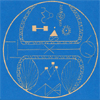Nautical Almanac, "Rooting for the Microbes"
 The liner notes read "No computers or electricity were employed in themusic making process." How that is possible baffles me, so I figure itmust be a joke or a half-truth. On the other hand, how a record wasmade rarely matters to me more than how it comes out sounding and Rooting for the Microbesis a bit of a mixed bag in that respect.
The liner notes read "No computers or electricity were employed in themusic making process." How that is possible baffles me, so I figure itmust be a joke or a half-truth. On the other hand, how a record wasmade rarely matters to me more than how it comes out sounding and Rooting for the Microbesis a bit of a mixed bag in that respect.Load
A consistent barrage ofwailing scratches and interstellar waves covers up, for a majority ofthe album, strangely distorted natural sounds like accordians, bells,clocks, and laughter. This combination of failing equipment andindefinite references to some kind of ghost world run by clowns staysfairly interesting from beginning to start; but Nautical Alamanac'sformula rarely changes. The rigid structure of each song somehowbecomes apparent through all the smoke and noise half way through thealbum and makes the remainder feel like a repeat of the first filteredthrough some altered dimesion. I can't help but think that this randomassortment of sounds is somehow comedic at its heart, maybe just a bitsurrealist. The assault of scratches, wheezes, and whines are neverthreatening and, even at loud volumes, never inspire any kind ofmadness or unbearable torment. The spasmodic current of the album neverallows for a consistency to build; any residue left behind by one soundis immediately destroyed by the following. "Cross Dementia" doesnothing short of spread laughter and the closing "Ocularis" only windseverything down to a calm and and slightly more silent end. So what'smissing? When the hidden track(s?) finally end and I'm left sitting inmy room, I feel like Nautical Almanac forgot some important ingredientsin their noise soup. For all their wackiness, Nautical Almanac somehowmanages to tell the same joke over and over. Where another group orindividual might succeed in making nonsense noise by severely wideningthe sound palette, Nautical Almanac stays static, relying on thegimmick of "no computers, no electricity" (if that is actually thecase) to carry the album. It boils down to this: the noise just soundslike noise. It has no compositional value and just seems like ahindrance on some of the other sounds that are trying to be heard. Hadsome more variety been packed into the noise end of the album and thencombined with all those excellent samples of the recognizable world, Rooting for the Microbes would have come away a lot more addicting than it is now.



